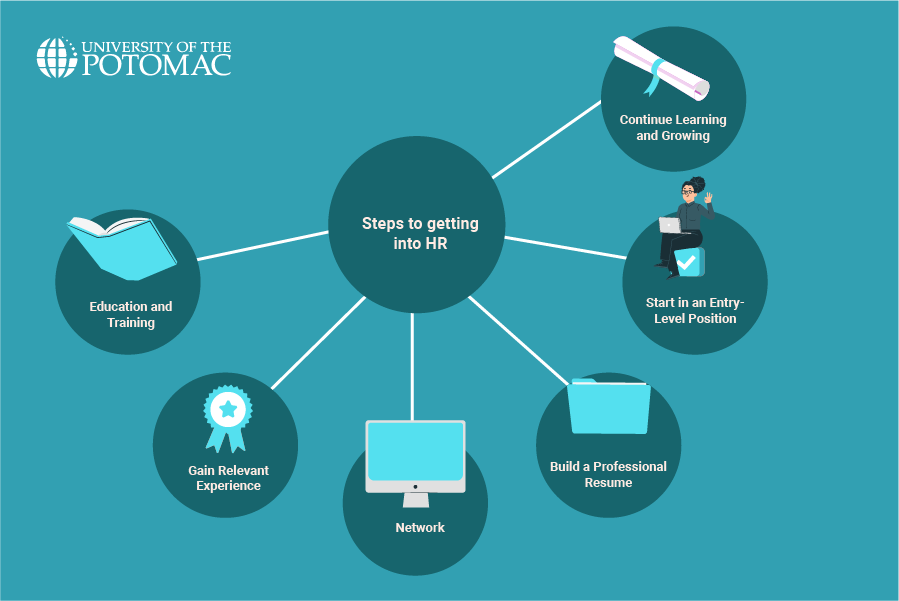Imagine working in an organization where employee grievances go unheard, recruitment processes are chaotic, and there is no one to ensure that the workplace complies with labor laws. Without HR professionals, companies would struggle with disorganized hiring, low employee morale, and high turnover rates, ultimately impacting productivity and profitability.
Human Resources (HR) is an excellent field to work in, offering numerous opportunities to positively impact organizations and employees. Whether you’re passionate about recruiting top talent, developing strategic policies, or managing employee relations, a career in this field can be both rewarding and fulfilling.
So, if you’re curious about how to get into HR and want to explore the various career paths available in this dynamic profession, keep reading and discover all that awaits you in the world of human resources.
What Is HR?
Human resources refers to a person or group of people representing a department within an organization responsible for managing the employee life cycle, which includes recruiting, hiring, onboarding, training, performance management, and offboarding. HR professionals ensure that the company’s most valuable asset—its people—is well cared for, motivated, and aligned with its goals.
The HR department also handles essential administrative tasks like payroll, benefits administration, and compliance with labor laws. Furthermore, they help shape company culture, foster a positive work environment, and implement policies that promote diversity and inclusion.
Essentially, they act as the bridge between management and employees, ensuring clear communication, resolving conflicts, and advocating for employee welfare. With their work, they aim to maximize employee performance and ensure that the organization runs smoothly and efficiently.
How To Get Into HR?

The path to a career in HR can vary from person to person, depending on individual circumstances and career goals. However, the following steps provide a general roadmap for entering the HR field and achieving success.
1. Education and training
As is the case with various other career paths, education is a fundamental step in pursuing a career in HR as well. While some may enter the field with an associate degree, most HR professionals hold at least a bachelor’s degree in human resources, business administration, psychology, or a related field. These programs provide foundational knowledge in organizational behavior, employment law, compensation and benefits, and human resource management.
In addition to a degree, obtaining HR certifications can significantly enhance your credentials and demonstrate your commitment to the field. Certifications such as the Professional in Human Resources (PHR), Senior Professional in Human Resources (SPHR), and Society for Human Resource Management Certified Professional (SHRM-CP) are options widely recognized and respected in the industry. They often require passing an exam and meeting specific educational and professional experience criteria.
2. Gain relevant experience
Experience is also crucial in HR. It allows you to apply theoretical knowledge to real-world situations and develop practical HR skills. Internships, part-time jobs, and volunteer opportunities in HR departments or related fields can provide valuable hands-on experience.
Many educational programs offer internship placements as part of their curriculum, providing a structured way to gain experience while simultaneously earning your degree.
3. Network
Building a professional network can open doors to job opportunities, provide mentorship, and offer insights into industry trends and best practices. Attending HR conferences, seminars, and workshops enables you to meet professionals in the field and learn from their experiences.
Joining professional organizations related to HR can also provide valuable networking opportunities. Such organizations often host events, webinars, and discussion forums where you can connect with other HR professionals.
Additionally, participating in online communities and social media groups focused on HR can help you stay informed and engaged with industry developments.
4. Build a professional resume
A well-crafted resume is essential for showcasing your qualifications and standing out to potential employers. Highlight your education, certifications, and relevant experience, focusing on specific achievements and contributions. Use action verbs and quantify your accomplishments whenever possible, such as “reduced employee turnover by 15%” or “implemented a new onboarding process that improved new hire retention by 20%.”
In addition to your resume, a strong LinkedIn profile can enhance your professional presence and make it easier for recruiters to find you. Ensure your profile is complete, up-to-date, and includes a professional photo. Use LinkedIn to connect with colleagues, join HR-related groups, and share industry-related content to demonstrate your expertise and engagement in the field.
5. Start in an entry-level position
Starting in an entry-level position is a common path for those new to HR. These roles provide an opportunity to learn the basics of HR and gain experience in various functions such as recruitment, employee relations, and benefits administration. Positions such as HR assistant, HR coordinator, and recruiter are typical entry points into the field.
In an entry-level role, focus on building your skills, gaining a thorough understanding of HR processes, and learning from more experienced colleagues. Take advantage of any training and development opportunities your employer offers, and continually seek feedback to improve your performance. Demonstrating a strong work ethic, enthusiasm, and a willingness to learn can help you advance to more senior positions over time.
6. Continue learning and growing
Lastly, it’s important to note that HR continually evolves in response to changes in the workforce, technology, and regulations. Therefore, to stay competitive and advance in your career, it’s essential to commit to lifelong learning and professional development.
So, attend workshops, webinars, and conferences to stay informed about the latest trends and best practices in HR. Reading industry publications, joining professional organizations, and participating in continuing education courses can also help you stay current and expand your knowledge.
In addition to formal education and training, seek out opportunities for on-the-job learning and growth. Volunteer for cross-functional projects, take on additional responsibilities and seek mentorship from experienced HR professionals. By continuously expanding your HR skills and knowledge, you can position yourself for career advancement and take on more challenging and rewarding roles in HR.
Top 5 HR Jobs
HR offers a variety of career paths, each with its unique focus and responsibilities. Here are the top five HR jobs that provide opportunities for growth and impact within an organization:
Interested in pursuing a degree?
Fill out the form and get all admission information you need regarding your chosen program.
This will only take a moment.
Message Received!
Thank you for reaching out to us. We will review your message and get right back to you within 24 hours.
If there is an urgent matter and you need to speak to someone immediately you can call at the following phone number:
- We value your privacy.
1. HR manager
HR managers oversee the HR department and ensure that all HR functions align with the organization’s strategic goals. Their responsibilities include managing recruitment and selection processes, developing and implementing HR policies, overseeing employee relations, and ensuring compliance with labor laws. These managers also work closely with senior leadership to address workforce planning and organizational development needs.
To succeed as an HR manager, individuals need strong leadership, communication, and problem-solving skills.
2. Talent acquisition specialist/Recruiter
Talent acquisition specialists, also known as recruiters, are responsible for identifying, attracting, and hiring top talent for the organization. They oversee the entire recruitment process, including candidate sourcing, interviews, job offers, and onboarding of new hires. Recruiters often work closely with hiring managers to understand staffing needs and develop effective recruitment strategies.
Success in this role requires excellent interpersonal and communication skills, as well as the ability to assess candidates’ qualifications and fit for the organization.
3. HR business partner (HRBP)
HRBPs serve as strategic advisors to specific business units within an organization. They work closely with management to align HR strategies with business objectives, provide guidance on workforce planning, and address employee performance and development needs. HRBPs also play a key role in change management initiatives and help foster a positive organizational culture.
To excel as an HRBP, individuals need a deep understanding of HR and business operations. Strong analytical, communication, and consulting skills are essential.
4. Compensation and benefits manager
These managers are responsible for developing and managing the organization’s compensation and benefits programs. Their duties include designing salary structures, administering benefits plans, conducting market research to ensure competitive pay, and ensuring compliance with regulations related to compensation and benefits. They also guide employees on compensation and benefits matters.
Success in this role requires strong analytical and financial skills and a thorough understanding of compensation and benefits practices.
5. Employee relations specialist
Such specialists focus on maintaining positive relationships between the organization and all its employees. They handle employee grievances, investigate workplace issues, and ensure compliance with employment laws and regulations. They also work to promote a healthy and productive work environment by developing and implementing employee relations programs and policies.
To succeed as an employee relations specialist, one needs strong conflict resolution, communication, and problem-solving skills.
The Bottom Line
Becoming an HR professional offers the unique opportunity to impact the lives of other employees and the overall success of an organization. Being well-prepared and knowledgeable in HR practices is essential for responsibly managing and supporting employees. And education and continuous learning are the keys to achieving this readiness.
Pursuing a degree in Business Administration at Potomac can equip you with the skills and knowledge needed to excel in this role and more. Remember, your ability to foster a thriving workplace starts with your commitment to learning and growth. So, join us, step into HR, and become the driving force behind a positive, productive, and harmonious work environment.
Frequently Asked Questions (FAQs)
What is the role of HR?
The role of HR is to manage and support the employee life cycle, including recruiting, hiring, onboarding, training, performance management, and offboarding. HR also ensures compliance with labor laws, administers employee benefits, and fosters a positive workplace culture.
How do beginners get into HR?
Beginners can get into HR by obtaining a relevant degree in human resources, business administration, or psychology and gaining certifications. Entry-level positions such as HR assistant or recruiter, internships, and networking can also provide valuable experience and opportunities in the field.
Why work in HR?
Working in HR provides the opportunity to make a significant impact on an organization’s success and employee well-being. It offers diverse career paths, the chance to work closely with people, and the ability to shape company culture and drive positive changes within the workplace.










